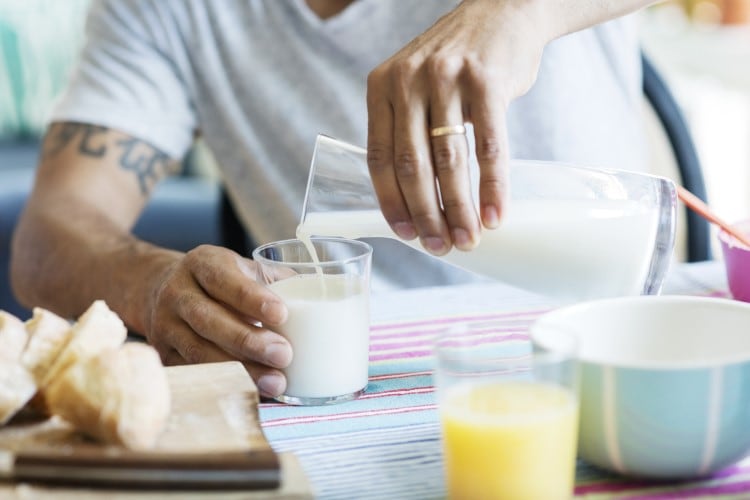Part of Parag Milk Foods Limited, one of the largest private dairy companies in India, Pride of Cows was introduced as a relatively novel proposition – a farm-to-home brand targeting consumers that seek fresh, traceable dairy products delivered from the farm to the table.
Pride of Cows’ product portfolio includes single origin milk, paneer, curd and ghee. The milk that goes into each product is sourced from a single farm - Bhagyalakshmi Dairy Farm, a 35-acre dairy near Pune in the western state of Maharashatra, which farms ‘pedigree cows’, we were told. Pride of Cows’ products are the only single-origin dairy offerings in India currently and are available in Mumbai, Pune, Surat, Delhi, Ahmedabad and Bangalore.

The whole and fat-free milk product is available only direct to consumer, while the ghee, curd and paneer offerings are also stocked by select specialist stores, we were told.
“Choosing our milk isn't just selecting a beverage - it's embracing heritage, supporting communities, and participating in a profound, sustainable future of food,” explained Akshali Shah, executive director at Parag Milk Foods.
But what sets the single origin dairy category apart from conventional or organic – and do consumers understand and value the differences? Shah told us single-origin dairy farming distinguishes itself through its approach to animal welfare, biodiversity and food quality standards; products also have ‘unique freshness and aroma’ compared to conventionally-produced dairy found in stores.
“While organic and conventional dairy production methods focus on broader standards and practices, single-origin dairy places a premium on the unique qualities of a specific geographic origin,” she said. “This approach appeals to consumers who value authenticity, traceability, and the distinct flavours and qualities that arise from a particular terroir and farming ethos.
“Single-origin dairy products are produced at one farm which is located in the specific geographic region, and from one breed,” she told us. “Single-origin dairy emphasizes traceability, ensuring consumers can easily identify the exact location and herd from where the dairy products originate. This transparency builds trust, as consumers can verify the source and production practices.”
Becoming a single-origin milk producer involves a series of steps and adherence to specific requirements and standards, Shah told us. These involve identifying a ‘single origin’ geographic region or location, which should have unique characteristics, including soil composition, climate, and natural resources – all factors that can influence the milk’s flavour and quality. If a single breed of cows is farmed, the animals must also be raised in the chosen geographic area, and there are a host of welfare and ethical farming practices that farmers need to facilitate (see box-out below for more information on this).
Steps to setting up a single-origin dairy operation
1. Select a specific geographic region or location that will serve as the 'single origin' area
2. Establish the farm or herd within the chosen area, including raising the herd within the same area if a single breed is farmed.
3. Implement quality assurance and animal care practices such as providing proper nutrition; ensuring comfortable and clean living conditions; adhering to animal welfare standards; monitoring the health and wellbeing of animals.
4. Embrace sustainable and ethical farming practices, e. g. do not of synthetic chemicals, hormones, and antibiotics; promoting biodiversity and soil health; implement eco-friendly waste management strategies; reduce environmental impact through responsible land use.
5. Establish a traceability system to track the journey of your dairy products from farm to table; maintain transparency by providing consumers with information about the origin, farming practices, and quality control measures.
6. Develop strict quality control protocols to ensure the consistent quality of your dairy products, e. g. minimal processing.
7. Comply with all local, state, and federal regulations and food safety standards related to dairy production and processing.
Shah said that at Bhagyalakshmi Dairy, Parag Milk deploys a combination of technology, data management, and quality control processes to ensure milk safety and quality. The farm addresses animal welfare through cow grooming, installing rubber mats inside the pens, using fans or foggers to push cool air in, playing soothing music and insulating the shed roof to minimize heat stress. “Our decision to introduce music to our farm was grounded in scientific research indicating its beneficial impact on animal behaviour and stress reduction cows exposed to soothing melodies experienced reduced stress levels, resulting in higher milk yields and overall improved well-being,” Shah explained. “Whereas, to maintain ideal temperature conditions, we've implemented a comprehensive approach encompassing fans and foggers, water sprinklers, temperature-controlled roofs etc. Furthermore, we've imported specialized mats from Germany to ensure our cows' comfort during resting periods.”
The farm also works with nutritionists to adjust the feed of cows according to their age and stage of lactation to bring the animals the ‘right balance of minerals and vitamins’. “Our team of dedicated nutritionists meticulously balances the minerals and vitamins in their diet, tailoring customized menu plans to meet their nutritional needs. Additionally, we regularly update their menu to include fresh seasonal crops,” Shah said. “Our wholesome meal consists of alfa, soya, maize, seasonal vegetables and greens.”
Cows also undergo ‘health checks’ three times a day; this includes weight checks to ensure cows receive the right balance of carbohydrates, proteins and fats. “We closely monitor their water intake as well, ensuring that they receive filtered, purified water,” Shah explained.
There are also measures being taken to ensure traces of antibiotics are minimized. “We are continuously improvising in our stringent quality policy so that our milk is free of any antibiotic residue,” she added.
“We are the first dairy farm in the country who has implemented naturopathy by using homeopathy and Ayurveda to treat our cows. This ensures milk is residue-free.”
“The goal is to provide consumers with a clear and reliable way to trace the journey of their dairy products back to the farm, promoting transparency and confidence in the product's source and quality.”
So who is single-origin milk for in India? According to Shah, this is the ‘discerning milk lover’ that looks for superior quality milk and is willing to pay a premium for it. “They are urban, modern consumers who are quality-conscious and take pride in their choices,” she said. “They are well-read and well-travelled with a high disposable income.”
Shah admitted the market for single-origin milk is still rather niche but she claims there is a ‘growing interest’ in urban areas driven by factors such as health consciousness, a desire for authentic flavors and environmental awareness. “Single-origin milk products can be positioned as a sustainable choice, especially if the farms follow ethical and eco-friendly practices,” she explained.
Besides Pride of Cows, Parag Milk Foods offers three brands – Govardhan (ghee), Go (cheese), and Avvatar (sports nutrition brand). In recent years, the company has been expanding its presence in the sports nutrition segment, where it sees a gap in the market, through premium protein supplements and powders.


